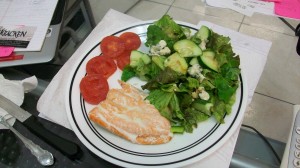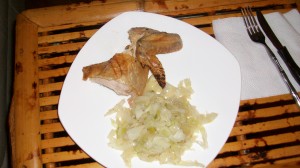By Guest Blogger Paula Jager, CSCS
 Halfway . . .
Halfway . . .
First of I would like to clear up any misconceptions from the initial post on my quest to lose 11 pounds of body fat. I am not doing this to make anyone feel bad about themselves. I am sharing a personal journey at this stage of my life and testing my hypothesis that it is primarily lifestyle that causes weight gain no matter what the age.
Second of all, I am not “self loathing”, “repulsed” or have any kind of self esteem issues. Because of my nutritional and exercise habits of the last several years along with the wisdom that can accompany those years and learning from mistakes in my misguided youth I am the strongest mentally and emotionally than at any other decade in my life. While I will never be 25 again–nor look like it–I am extremely comfortable in my own slightly lined skin. I do not over exercise releasing large amounts of cortisol and exhausting my adrenal glands but train appropriately in moderate amounts to stay strong and healthy; listening to my body.
Recovery is huge as you age; at 51–and this may not be true at 71–I can still go as long and as hard as my younger counter parts just not as often and I am ok with that. It gives me more time for the other things I like to do in my very balanced life.
Back to the topic at hand and how I have lost 7 lbs in the last 5 weeks. . .
 After keeping a 3 week log my average daily caloric intake based on 2/19 — 3/10 was 2400 calories a day. The foods were all from quality sources and the meals home cooked. My “indulgences” were averaging 2+x a week coming from homemade ice cream, 70% cacao bars and grits–we all have our weaknessesïŠ The macronutrient ratios were near ideal: about 21% protein, 19% carbs and 60% fat on average. Why then was all that junk in my trunk? My journal is public; to view it the before the Challenge go to. . .
After keeping a 3 week log my average daily caloric intake based on 2/19 — 3/10 was 2400 calories a day. The foods were all from quality sources and the meals home cooked. My “indulgences” were averaging 2+x a week coming from homemade ice cream, 70% cacao bars and grits–we all have our weaknessesïŠ The macronutrient ratios were near ideal: about 21% protein, 19% carbs and 60% fat on average. Why then was all that junk in my trunk? My journal is public; to view it the before the Challenge go to. . .
www.fitday.com Login: unsername is #1 jaguar and password is shebeast
Couple of reasons, main one being I was consuming too many calories, duh!! Average protein per day was 125g (good), carbs 115 g (good for maintenance) and fat 163g (too high–I’m not quite that active). My log shows me that while the right fats are necessary and very important out of the 3 macronutrient ratios that’s where my excess calories were coming from. Eating tablespoons of nut butter, hunks of cheese, drowning myself in raw cream and one too pieces of homemade cheesecake were more than I needed. Portion sizes are important. My activity levels at present do not demand that much energy. And while the sources are all good, I’m not burning the fuel and it’s getting stored as fat. By putting the times in my food log I also see that I am eating too late or my largest meal consistently as the last.
 So what did I change? I reduced my fat intake by about 20% (this is only because I was grossly overeating in that area) which will put me down to about 115 g a day, cut back my carbohydrates to about 50 g a day for the first 2 to 3 weeks and kept the protein at around 95 to 120 g a day to support my 102 lbs of lean body mass and strength training activity levels. This will save me about 300 to 400 calories a day. Depending on how I looked, felt and was losing I adjusted as needed during the initial 5 weeks. I kept the largest volume of my carbohydrate intake immediately following my workouts. I did not change my exercise as I was already working out an average of 3-4 days a week consisting of 2 to 3 high intensity weight lifting days and 1 day of some type of sprinting with mobility work interspersed throughout the week.
So what did I change? I reduced my fat intake by about 20% (this is only because I was grossly overeating in that area) which will put me down to about 115 g a day, cut back my carbohydrates to about 50 g a day for the first 2 to 3 weeks and kept the protein at around 95 to 120 g a day to support my 102 lbs of lean body mass and strength training activity levels. This will save me about 300 to 400 calories a day. Depending on how I looked, felt and was losing I adjusted as needed during the initial 5 weeks. I kept the largest volume of my carbohydrate intake immediately following my workouts. I did not change my exercise as I was already working out an average of 3-4 days a week consisting of 2 to 3 high intensity weight lifting days and 1 day of some type of sprinting with mobility work interspersed throughout the week.
First 2 weeks of this I felt phenomenal and had a steady loss of about 1 ¼ pound a week. I was not hungry, I did not feel deprived, I had no cravings and I was satisfied. After about the 3rd week I felt something was “off”; my energy was fine throughout the day but not what it needed to be during my workouts. I also was having trouble sleeping (which I never do). I felt “wired”. Because of the intense and frequent nature of my workouts I added in an additional piece of fruit after the first 3 weeks and a bit of starchy vegetable (sweet potato, turnip, beet or red potatoes) about every 2 to 3 days or as my body felt it needed it. If I am not exercising I do fine on considerably less carbohydrate. If someone is grossly overweight, sedentary and has metabolic derangement they would not need the extra carbohydrate. This imo is highly individual and would depend upon the amount of body fat one has to lose also. After about 5 days of slightly upping the carbohydrate intake to around 85-100 g issues resolved. I am down 7 ½ pounds with 3 ½ weeks left and 3 ½ lbs to go. Body fat dropped from 18.7% to 15.4%.
To view my nutritional intakes on the challenge please go to www.fitday.com Login: username is pjager and password is #1shebeast
My caloric needs along with my macronutrient ratios will not work for everyone. We are all metabolically individual and several factors such as age, gender, activity level and genetics will influence. If I had to give my opinion (and that is all it is) on a default macronutrient ratio for most people I would have to say around 15-30% protein / 10 to 30% carbohydrate and 50-70% fat. That’s a big range but there is also a big difference between how an overweight, sedentary sick person would eat and a healthy athlete training intensely. There is not a one size fits all equation.
At this midway point, I will have to say that my initial hypothesis that lifestyle choices (in nutrition and exercise) rather than the inevitability of weight gain for post menopausal women is looking very good.
One Confession I must make: I drink coffee–1 big cup everyday–Starbucks organics. Weaknesses–we all have them; but at least it has plenty of raw cream and no sugar.
Stay tuned for the final chapter and After Photos. . .

Paula Jager CSCS and Level 1 CrossFit and CF Nutrition Certified is the owner of CrossFit Jaguar.
Her exercise and nutrition programs yield life changing results








Eagerly waiting for Part III – the pics!